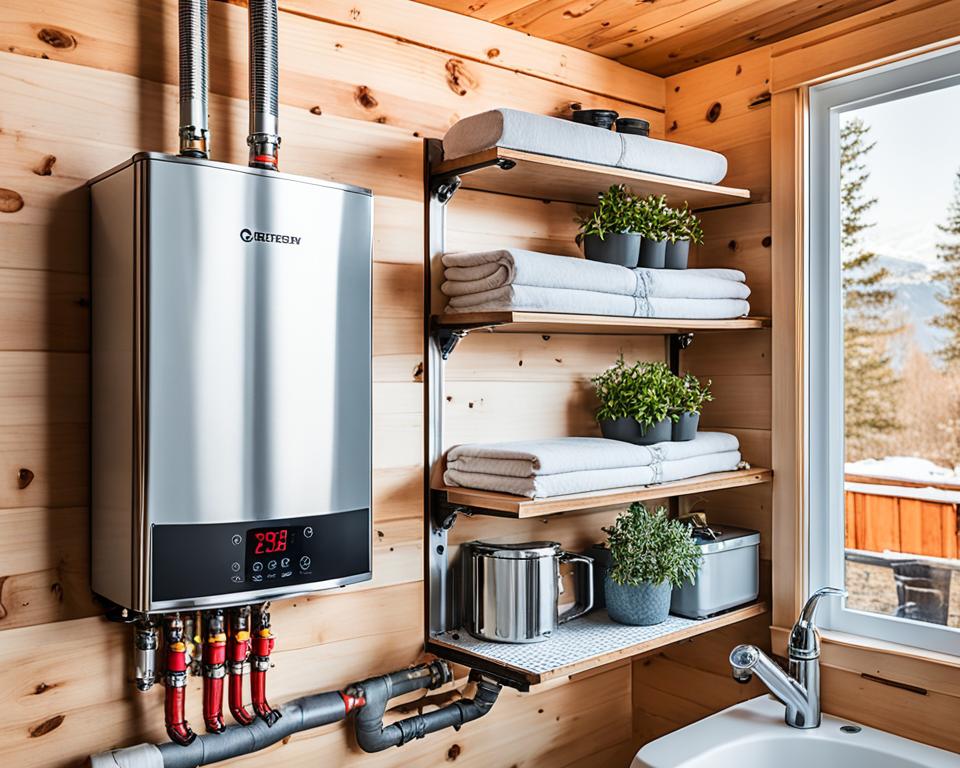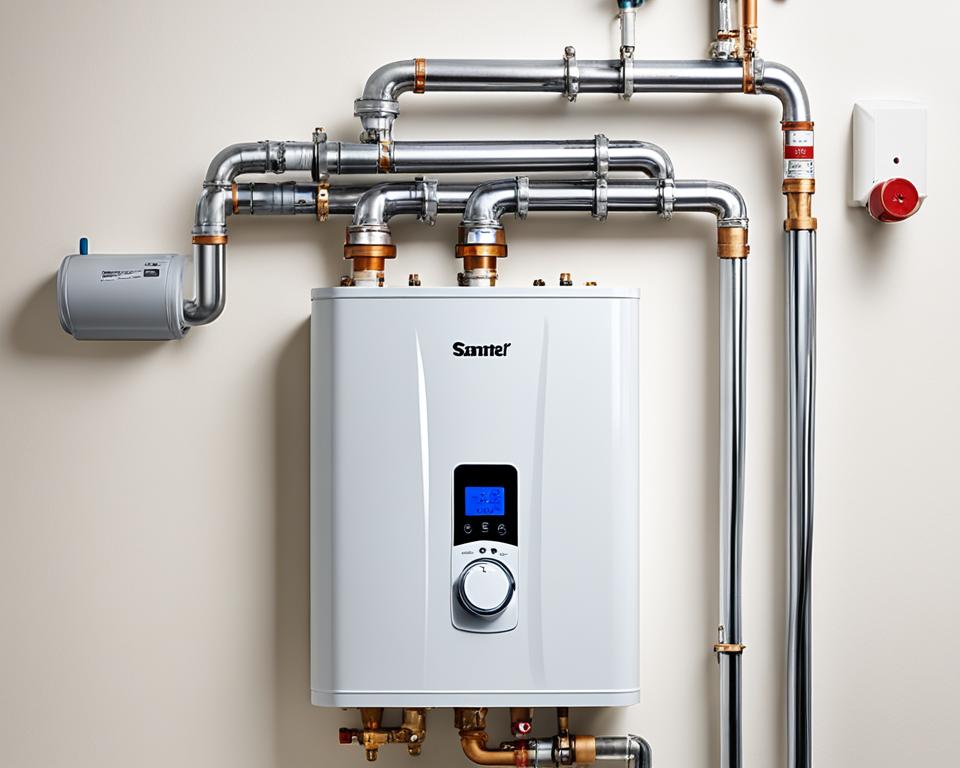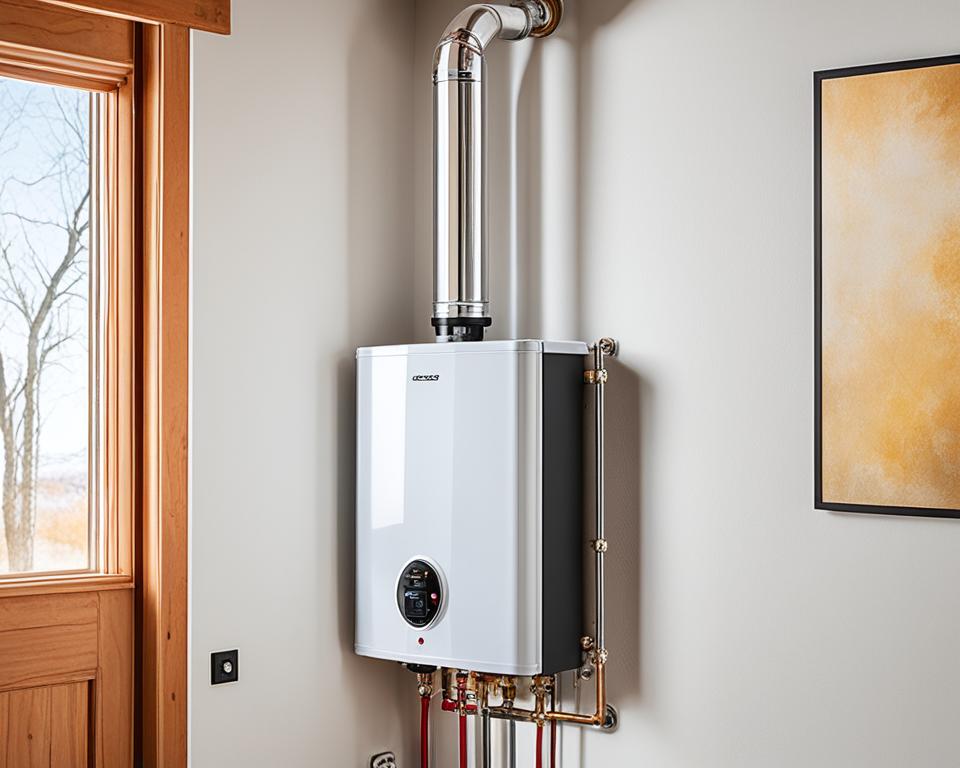Did you know tiny house residents can cut utility bills by up to 20% with an efficient tiny home water heater? This statistic underscores the importance of selecting the right tiny house hot water heater. It ensures comfort while maintaining efficiency. As experts in home solutions, we emphasize the value of a dependable, compact home hot water system. It’s vital for those in the tiny house community.
Our thorough examination of the market’s options focuses on water heaters that are space-efficient and economical. We’ll show you how living in a tiny home doesn’t require giving up the luxury of warm showers or the ease of instant hot water. Rely on our knowledge to navigate the array of hot water heaters designed for the unique limitations and needs of tiny homes.
Why Tiny House Hot Water Heaters Are a Must-Have
In the tiny living community, the value of a hot water heater is well-known. Every inch matters in small spaces, making the choice of appliances critical. We’re diving into why a space-saving hot water heater for tiny houses is vital. We’ll look at the advantages these compact units bring to tiny home dwellers.
Maximizing Space in a Compact Home
Finding right-sized appliances for a tiny house can be tough. A mini house water heater fills this need perfectly. Unlike larger models, it provides hot water without taking much space. This makes a compact, wall-mounted water heater key for saving valuable living area.
Energy Efficiency and Eco-Friendly Benefits
Choosing to live in a tiny house means embracing sustainability. Smaller water heaters use less energy, making them more efficient. Opting for a space-saving hot water heater for tiny houses cuts energy use. This move lowers utility costs and supports environmental health.
The Convenience of Immediate Hot Water
Tiny living doesn’t mean sacrificing instant hot water. For daily tasks, immediate hot water access is indispensable. Modern mini house water heaters offer efficient solutions. They ensure we enjoy quick hot water, maintaining comfort in compact living quarters.
Key Features to Look for in a Tiny House Hot Water Heater
When adding a tiny house tankless water heater to our space, considering several features is vital. These heaters, ideal for compact homes, offer unique benefits. They ensure we choose wisely, enhancing our living experience daily.
Size and Fitting Concerns: Space is a luxury in tiny homes, making the size of the heater crucial. We need a model that fits our limited area without losing efficiency. An on-demand hot water heater for small living spaces is optimal. It delivers necessary hot water instantly, omitting the need for a bulky storage tank.
Energy Consumption: In tiny homes, energy efficiency affects our utility bills significantly. Choosing an energy-efficient model can save money over time. Moreover, it’s an eco-friendly choice, cutting down our carbon footprint. This makes it beneficial for both our finances and the planet.
User-Friendliness: Easy-to-use controls are essential. They allow us to adjust temperatures without hassle. Such convenience is crucial in a tiny home, where ease of use is prized.
Capacity: Despite limited space, the heater must meet our hot water needs. We must consider our daily usage. The chosen heater should support our demands efficiently, without straining its capabilities.
| Feature | Importance | Benefit |
|---|---|---|
| Compact Size | High | Does not encroach on living space |
| Energy Efficiency | High | Reduces operational costs and environmental impact |
| Capacity | Moderate to High | Ensures consistent supply of hot water as per demand |
| User-Friendly Interface | High | Simplifies operation and temperature control |
To conclude, choosing a tiny house tankless water heater means more than picking any model. It’s about selecting a unit that balances size, efficiency, ease of use, and capacity. This ensures a cozy, cost-effective living environment. The ideal on-demand hot water heater for small living spaces meets all these criteria, offering us uninterrupted hot water access without compromising our valued space.
Gas vs. Electric: Which Hot Water Heater Suits Your Tiny Home?
Choosing between a gas and an electric hot water heater goes beyond preference. It’s crucial for matching your lifestyle and space constraints. This discussion will guide you through the benefits of each, aiming to pinpoint the perfect choice for your tiny home’s water heating needs.
Comparing Fuel Sources
The choice of a portable hot water heater for tiny homes hinges on available fuel sources. Gas heaters shine with their quick heating ability and cost-effectiveness, given natural gas access. In contrast, electric heaters are straightforward and safer, appealing to those desiring a green solution. Yet, they might spike power usage, posing issues for off-grid living.
Installation and Safety Considerations
Integrating a small dwelling water heater demands careful installation. Gas units need proper vents to avert carbon monoxide risks, requiring exhaust systems. Electric models, while free from ventilation needs, must comply with electrical standards and might need extra insulation for efficiency. Addressing these safety measures ensures your tiny home remains secure.
Long-Term Cost Implications
Evaluating long-term costs involves looking at energy rates and upkeep expenses for tiny home hot water heaters. Gas models are generally cheaper to run if gas prices stay low, despite higher setup costs due to gas lines and vents. Electric heaters are less expensive initially and simpler to maintain, appealing for cost-conscious dwellers.
In deciding between gas and electric water heaters, weigh your home’s needs, energy access, and priorities like eco-friendliness and cost. These reflections guide towards a well-informed choice for your tiny home’s hot water solution.
Tiny House Hot Water Heater Capacity: Sizing It Right
Choosing an efficient tiny home water heater requires attention to its capacity. It’s vital to balance sufficient hot water with the limited space in a tiny house. We offer essential advice to pinpoint the ideal hot water heater size for your needs.
To start, we examine the average hot water usage per person and the space for a heater in a tiny home. A well-matched system meets user needs without excess capacity. This ensures efficiency.
| Number of Residents | Daily Use Per Person (Gallons) | Recommended Heater Capacity (Gallons) |
|---|---|---|
| 1 | 20 | 30-40 |
| 2 | 40 | 50-60 |
| 3 | 60 | 80-100 |
| 4 | 80 | 100-120 |
For solo dwellers, a heater at the smaller end of the range works, making it an efficient tiny home water heater. Yet, activities like showering, dishwashing, and doing laundry could increase capacity needs. Opting for a larger size may be smart if your usage is high.
- Consider peak hour demand – the highest one-hour hot water consumption in your day.
- Assess the flow rates of your fixtures and how you use them simultaneously.
- Take into account the recovery rate – how quickly the heater replenishes hot water.
In conclusion, picking an efficient tiny home water heater hinges on knowing your water usage. Correct sizing assures both comfort and energy efficiency, saving costs in the long term. Remember the mentioned elements to select the best heater for your tiny house.
Reviewing the Best On-Demand Hot Water Heater for Small Living Spaces
Enhancing tiny home comfort significantly involves choosing the right tiny house tankless water heater. These heaters do not just bring the benefit of instant hot water. They also maximize limited living space, crucial for a tiny house lifestyle.
The Pros and Cons of Instantaneous Heating
An on-demand hot water heater provides continuous hot water on request. It heats water directly as needed, eliminating the bulky tank. But, there are downsides, such as high initial costs and the need for precise demand matching for efficiency.
Leading Brands and Models
In the market for tiny homes, several brands are recognized for their efficient tankless water heaters. Rinnai, EcoSmart, and Noritz top the list, praised for their performance. They offer models ranging from basic to those with smart technology, catering to diverse requirements.
Consumer Feedback and Performance Analysis
User and expert feedback generally shows high satisfaction with tankless systems. Highlights include lower energy costs and how well they fit into small spaces. This segues into a deeper comparative look.
| Brand | Model | Efficiency Rating | Capacity (GPM) | User Rating |
|---|---|---|---|---|
| Rinnai | RL Series HE+ | 9.4/10 | 7.5 | 4.5 stars |
| EcoSmart | Eco 11 | 9.8/10 | 3.1 | 4.3 stars |
| Noritz | NRC66DV | 9.3/10 | 6.6 | 4.7 stars |
Our analysis highlights the critical role of efficiency rating and capacity in pleasing users. In the pursuit of ideal small living, the on-demand hot water heater for small living spaces proves essential. It’s a key feature that enhances tiny house living significantly.
The Benefits of Going Tankless in Your Mini House Water Heater

Adopting a tiny living lifestyle doesn’t force you to give up the convenience of modern amenities like hot water. Choosing a tiny house tankless water heater offers significant advantages for maximizing efficiency and comfort in small spaces. One major perk is the reduction in operating costs. Tankless models only heat water as needed, avoiding the expense of maintaining a reservoir of hot water and potentially lowering your utility bills.
The endless hot water supply of a tiny house tankless water heater is a standout feature. It lets you shower, do laundry, and wash dishes simultaneously without running out of hot water. These heaters also boast longevity beyond that of traditional tanks, making them a wise investment for the future of your tiny home.
- Lower Operating Costs
- On-Demand Hot Water Supply
- Increased Longevity
- Space-Saving Design
- Energy Efficiency
Let’s look at how tankless water heaters compare to traditional tank models in tiny homes:
| Feature | Tankless Water Heater | Traditional Tank Water Heater |
|---|---|---|
| Space Required | Minimal – Can be wall-mounted | Substantial – Requires floor space |
| Energy Consumption | Less – Only when water flows | More – Continuous to maintain temperature |
| Hot Water Supply | Endless – Heats on demand | Limited – Dependent on tank size |
| Cost Over Time | Lower – Reduced utility bills | Higher – Energy inefficiency |
| Lifespan | Longer – Often up to 20+ years | Shorter – Typically around 10-15 years |
Tiny home owners find the tiny house tankless water heater to be an ideal choice for its blend of functionality, efficiency, and savings over time. This has made it popular among those looking to reduce both costs and environmental impact in their small living spaces.
Portable Hot Water Heater for Tiny Homes: Flexibility on the Go
As enthusiasts of minimalist living, we recognize the importance of having a portable hot water heater for tiny homes. These devices ensure you have hot water whenever needed. They are also simple to move, making them perfect for those who frequently change locations. In this article, we delve into their benefits and highlight excellent options for the nomadic tiny home dwellers.
Advantages of Portability
For tiny home owners, the portability of a hot water heater is transformative. It simplifies the moving process and adds versatility to your home’s design. Additionally, these heaters can be utilized outdoors, enhancing experiences like outdoor showers or cleanup tasks post-adventure.
Top Portable Models for Travelers
Choosing the right portable hot water heater for tiny homes means finding one that combines reliability, simplicity, and suitability for small spaces. In our search, several models stood out as ideal for the traveling lifestyle of tiny home residents.
| Brand | Model | Heating Method | Capacity | Weight | Notable Features |
|---|---|---|---|---|---|
| EcoTemp | L5 Portable Tankless | Propane | 1.5 GPM | 13.8 lbs | Outdoor installation; Overheat safety shut off |
| Camp Chef | HWD5 Triton | Propane | 1.5 GPM | 14 lbs | Fully adjustable heat and water flow |
| Bosch | Tronic 3000T | Electric | 2.5-7 gallons | Varies | Can be shelf, wall or floor mounted; Point-of-use |
Maintenance Tips for Longevity
To keep your portable hot water heater for tiny homes running well, regular upkeep is key. This includes inspecting for wear, cleaning intake filters, and proper venting for propane models. Furthermore, it’s vital to drain the system before periods of disuse to avoid freeze damage.
Choosing a tiny home life that includes frequent moves doesn’t mean sacrificing hot water comforts. With an appropriate portable hot water heater, seamless, on-demand hot water will accompany you wherever you decide to venture.
How to Install a Tiny House Hot Water Heater Safely and Efficiently

Starting the journey of a small dwelling water heater installation involves unique challenges, mainly due to limited space and specific safety requirements. Fortunately, by adhering to our guidelines, achieving an efficient and secure compact home hot water system setup is possible. Let us delve into the crucial steps for a flawless installation process.
- Choose the Ideal LocationPicking the right spot is crucial for ventilation and access to plumbing and electrical connections. Wall-mounted heaters can be a space-saving solution in tiny homes.
- Review Local Codes and RegulationsCompliance with local building codes and obtaining the necessary permits is essential for meeting legal safety standards.
- Gather the Right Tools and MaterialsCollecting the required tools and materials beforehand is vital. Your list should include pipes, fittings, insulation, and mounting hardware.
- Install Proper VentilationIn confined spaces, excellent ventilation is crucial. It’s important to ensure the exhaust system doesn’t recirculate air back inside.
- Connect Water LinesIt’s important to follow the manufacturer’s instructions when connecting water lines, and use insulation to minimize heat loss.
- Electrical or Gas ConnectionsFor electric heaters, a dedicated circuit is necessary. For gas models, ensure all connections are secure and provide enough pressure.
- Test the SystemAlways check the system for leaks or issues before finalizing. Monitoring early performance is essential for detecting problems quickly.
- Regular MaintenanceFollowing the manufacturer’s maintenance recommendations ensures your system’s longevity and efficiency.
By adhering to these steps, you’ll effectively complete your small dwelling water heater installation. Should uncertainties arise, seeking professional assistance ensures both the safety and efficiency of your compact home hot water system setup.
“Ensuring a successful water heater installation in a tiny house is all about meticulous planning and respecting safety protocols. It’s not just about saving space, but also about creating a reliable system that stands the test of time.”
Always put safety first and consult experts when needed. The assurance and comfort from a well-installed water heater in your tiny home justify the effort.
Tiny House Tankless Water Heater: Revolutionizing Small Space Living
Living minimally doesn’t mean forsaking the comforts of modern life, such as enjoying a hot shower after a taxing day. The advent of the efficient tiny home water heater, particularly the tiny house tankless water heater, is a breakthrough for tiny home residents. It offers the luxury of instant hot water without taking up the space traditional tanks require.
Understanding the Technology Behind Tankless Heaters
Tankless water heaters’ main draw is their method of heating water directly, bypassing the need for a bulky storage tank. When you turn on the hot water tap, cold water moves through a pipe into the unit and is heated by gas or electricity. This method is not only space-saving but also energy efficient. It avoids the energy waste of maintaining a heated tank of water.
User Experiences with Tankless Models
Feedback from tiny house tankless water heater users has been overwhelmingly positive. They praise the units’ compactness, rapid water heating, and the long-term energy cost savings. Yet, buyers must assess their needs since tankless heaters’ flow rates and capacities vary. Picking the appropriate model ensures your tiny home’s hot water demands are fulfilled.
Is Tankless Right for Your Tiny House?
Choosing a tankless water heater for your tiny home involves considering your water use, space, and financial plan. Renowned for efficiency, tankless water heaters align with minimalist, eco-friendly living goals. Their compact and portable nature suits the mobile tiny house lifestyle, ensuring you have access to hot water wherever you go.
In our journey with tiny living, access to hot water without compromising on space or efficiency is crucial. The tiny house tankless water heater emerges as an ideal solution for the constraints of living small. By reflecting on user insights and your living conditions, you can decide if a tankless model will enhance your tiny home life.
Space-Saving Hot Water Heater Solutions for Tiny Houses
In the world of tiny living, efficiency matters more than ever. Finding a hot water heater that fits a tiny house’s needs is crucial. Homeowners want appliances that are compact, powerful, and economical. This article will explore advanced hot water heaters designed for the minimal space of tiny houses.
Water heating technology has evolved, with models now smaller yet still effective. For example, tankless water heaters have changed the game. These sleek units heat water on demand, eliminating the need for a bulky tank. This innovation not only saves space but also cuts down on energy use, offering cost and environmental advantages.
Solar-powered water heaters represent the forefront of eco-friendly technology. Utilizing the sun’s energy, they provide a sustainable way to heat water. These systems lower utility costs and reduce carbon footprints significantly. They embody the perfect balance of modern convenience and environmental consciousness for tiny house living.

